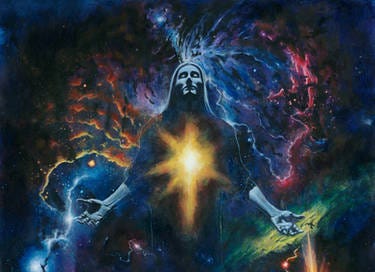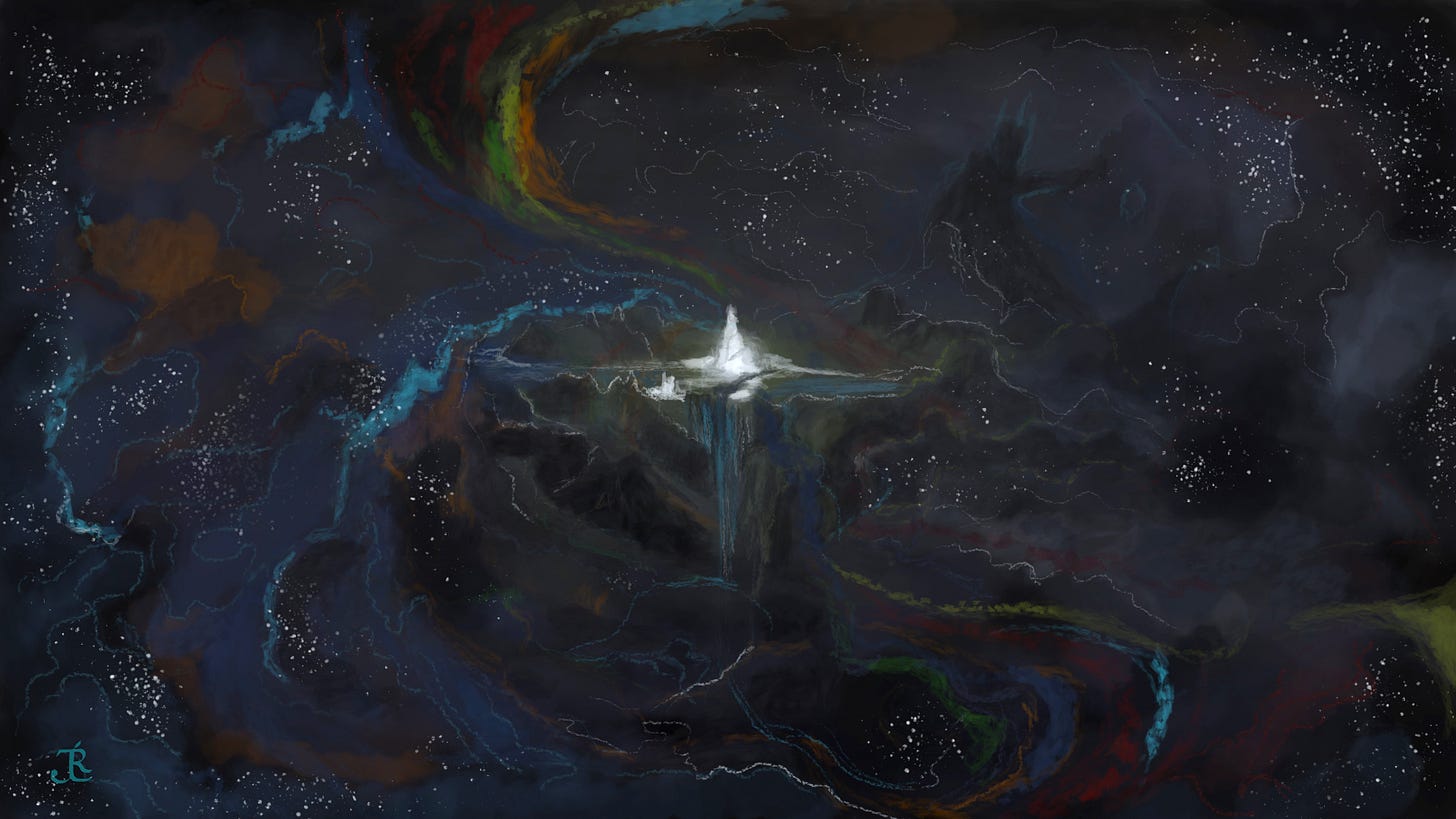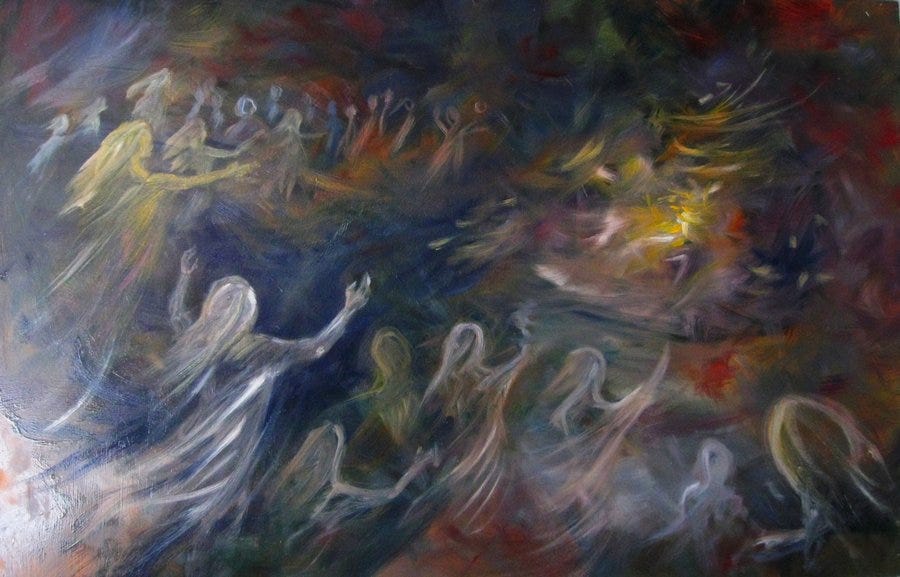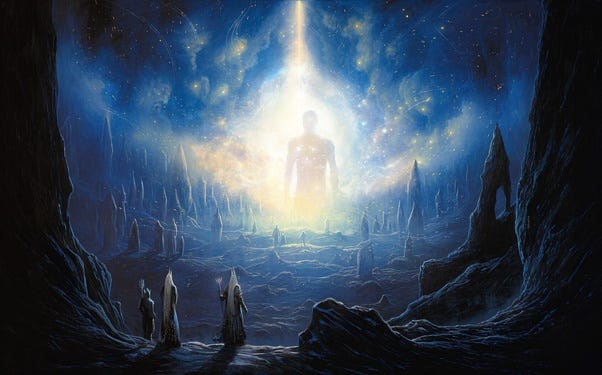I’m sure that at least some of you have been introduced to the fantasy world of J.R.R. Tolkien through The Hobbit or The Lord of the Rings, and even if you have never read them you are at least familiar with the film adaptations. But the most epic and ambitious of Tolkien’s writings was his grand creation myth, The Silmarillion. All of Tolkien’s mythopoeic writings, including these three stories, are Tolkien’s mythic retelling of the pre-historical Earth (which he refers to as Arda). The Silmarillion is broken up into five parts and it tells the story of the early days of Arda from the creation of the universe (or Eä) up until the beginning of the Fourth Age. (By the way we are currently living in the year 2024 of the Seventh Age, the final age of the World.)
The first part of the Silmarillion, The Ainulindalë, is probably one of the most beautiful stories ever put to paper. It tells of the creation of Eä, the Known World. As Tolkien intended, the story is very similar to the beginning of the book of Genesis. God is in Heaven with his angels that he has created, and all else is formless and void. God then wishes to bring into existence the universe and fill it with his creation. But this is where Tolkien’s myth slightly differs from the Biblical tale.
Tolkien spoke often about sub-creation, the idea that humanity makes things by the law in which we are made, that we possess an innate desire to create because we are created. When we tell stories or build things using natural materials, we are imitating our Father in Heaven, who alone possesses the true ability to create. So in Tolkien’s myth, God decides that he wants his angels to be active participants in the creation of the World.
Eru Illúvatar (God) gives to each of the Ainur (angels) a theme of music, and each theme gives them a glimpse into the mind of Illúvatar, but only pertaining to the part from which the theme came. As the Ainur begin to sing their themes to one another, they slowly begin to understand Illúvatar more and their music grows in harmony. Eventually, Illúvatar calls together all of the Ainur and declares to them a mightier theme that amazes them and they bow down before his feet in reverence. Illúvatar then tells the Ainur that they have been kindled with the Flame Imperishable (the Holy Spirit) and that they are to use the themes that have been given to them together to create a Great Music. After the music has gone on for a while, Melkor (Satan), the mightiest and most knowledgeable of all the Ainur begins to weave into the music his own thoughts that are not in accord with the theme of Illúvatar. As soon as Melkor begins to alter his theme, he causes a great discord all around him and the music begins to change. Illúvatar rises up and raises his left hand, and a new theme begins which Melkor and his followers immediately contend with. Illúvatar then raises his right hand and a new, softer theme begins which cannot be overtaken by the discord of Melkor. As Melkor continues to try and battle against the music, Illúvatar rises one final time and raises both of his hands, and with one final chord the music ceases.
Then Tolkien gives us what is maybe the most beautiful description of God’s will and God’s plan that I have ever heard when Illúvatar speaks to the Ainur:
“Mighty are the Ainur, and mightiest among them is Melkor; but that he may know, and all the Ainur, that I am Illúvatar, those things that ye have sung, I will show them forth, that ye may see what ye have done. And thou, Melkor, shalt see that no theme may be played that hath not its uttermost source in me, nor can any alter the music in my despite. For he that attempteth this shall prove but mine instrument in the devising of things more wonderful, which he himself hath not imagined.”
Illúvatar then takes the Ainur out into the Void, and he shows them a vision of the universe, the World that they have shaped with their music. In this vision they see many of the events that are to take place throughout the history of the world. The Ainur now see the meaning of Illúvatar’s rebuke of Melkor. They see that there is no evil or harm that can be done that lllúvatar cannot take and use to create a new good or new beauty. No matter how hard Melkor tries to thwart the plans of Illúvatar he will fail, because he only has the power to distort while the power to create belongs to Illúvatar alone. In real life we are shown this through the story of humanity. Satan believes that he has beaten God when he causes the fall of man, but ultimately he just begins the greatest story in the history of time, the story of the redemption and salvation of man.
I love that in Tolkien’s myth, God has the angels participate in the creation of the World. It serves as a precursor to the way that humanity create things using their gifts of the Holy Spirit that resides in them, and it allows Tolkien to introduce his themes of sub-creation, God’s will, and God’s plan.
Tolkien’s Legendarium is an abounding trove of Catholic themes and I look forward to sharing many more of them with you.
God Bless You All and Namárië
Michael







